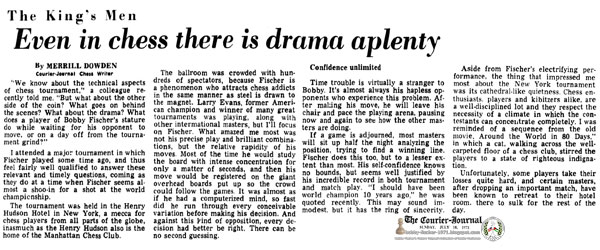The Courier-Journal Louisville, Kentucky Sunday, July 18, 1971 - Page 45
The King's Men - Even in Ches There is Drama Aplenty by Merrill Dowden
“We know about the technical aspects of chess tournament,” a colleague recently told me. “But what about the other side of the coin? What goes on behind the scenes? What about the drama? What does a player of Bobby Fischer's stature do while waiting for his opponent to move, or on a day off from the tournament grind?”
I attended a major tournament in which Fischer played some time ago, and thus feel fairly well qualified to answer these relevant and timely questions, coming as they do at a time when Fischer seems almost a shoo-in for a shot at the world championship.
The tournament was held in the Henry Hudson Hotel in New York, a mecca for chess players from all parts of the globe, inasmuch as the Henry Hudson also is the home of the Manhattan Chess Club.
The ballroom was crowded with hundreds of spectators, because Fischer is a phenomenon who attracts chess addicts in the same manner as steel is drawn to the magnet. Larry Evans, former American champion and winner of many great tournaments was playing, along with other international masters, but I'll focus on Fischer. What amazed me most was not his precise play and brilliant combinations, but the relative rapidity of his moves. Most of the time he would study the board with intense concentration for only a matter of seconds, and then his move would be registered on the giant overhead boards put up so the crowd could follow the games. It was almost as if he had a computerized mind, so fast did he run through every conceivable variation before making his decision. Ad against this kind of opposition, every decision had better be right. There can be no second guessing.
Confidence Unlimited
Time trouble is virtually a stranger to Bobby. It's almost always his hapless opponents who experience this problem. After making his move, he will leave his chair and pace the playing arena, pausing now and again to see how the other masters are doing.
If a game is adjourned, most masters will sit up half the night analyzing the position, trying to find a winning line. Fischer does this too, but to a lesser extent than most. His self-confidence knows no bounds, but seems well justified by his incredible record in both tournament and match play. “I should have been world champion 10 years ago,” he was quoted recently. This may sound immodest, but it has the ring of sincerity.
Aside from Fischer's electrifying performance, the thing that impressed me most about the New York tournament was its cathedral-like quietness. Chess enthusiasts, players and kibitzers alike, are a well-disciplined lot and they respect the necessity of a climate in which the contestants can concentrate completely. I was reminded of a sequence from the old movie, “Around the World in 80 Days,” in which a cat, walking across the well-carpeted floor of a chess club, stirred the players to a state of righteous indignation.
Unfortunately, some players take their losses quite hard, and certain masters, after dropping an important match, have been known to retreat to their hotel room, there to sulk for the rest of the day.























